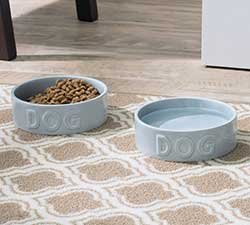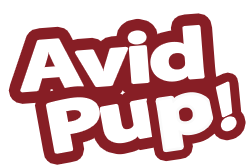Growing puppies need a lot of fuel to support their development.
The first year or two of life is the most crucial! How you feed them can set your pup up for success or cause some debilitating diseases later on.
Unfortunately, few puppy owners realize the importance of a well-planned feeding schedule.
You can’t just provide food willy nilly and expect your puppy to make all the decisions. Instead, it would be best if you portioned meals based on their development.
Most know that young puppies need multiple small meals in the early stages of life. But when can you switch your puppy to two meals a day?
Why Puppies Need Several Meals Everyday
Before we answer that burning question, let’s talk about why puppies need multiple meals in the first place. Feeding a young pup is a balancing act.
You have to provide enough sustenance to support their growing bodies but not so much that it causes weight and development issues.
Several small meals throughout the day help you manage a puppy’s caloric intake a little more efficiently. Most young canines aren’t capable of eating huge meals.
Even if they are, doing so can lead to a world of trouble.
First, large single meals lead to an uneven distribution of energy. Your puppy would have tons of energy to deplete shortly after eating. But after that?
They’ll likely experience an energy crash and spend most of the day sleeping. Pups sleep a lot as it is.
You must provide a steady source of energy to keep these creatures moving and active.
Hypoglycemia & Obesity
Puppies are at a high risk of developing hypoglycemia, which can lead to further complications if you’re not careful. Spacing meals is the best way to avoid it!
Secondly, large meals can lead to obesity.
Weight gain isn’t just a cosmetic issue with puppies. It can cause severe developmental problems.
As if that wasn’t bad enough, many of those problems won’t manifest themselves later on in life. We’re talking about joint problems, skeletal disorders, and more.
Separating daily food requirements into three or four meals will make it easy for pups to stay healthy.
When to Switch Your Puppy to Two Meals a Day
As a general rule of thumb, puppies are ready to transition to two structured meals at around six months of age.
At this point, your dog is still a growing puppy. But, you’ll notice that your young companion’s development is starting to slow down a big.
That sudden growth spurt is becoming more predictable and easy to follow. Their energy levels may begin to stabilize, too.
That’s not to say that your puppy will become lazy and non-active.
Young dogs still have a seemingly endless supply of energy at their disposal! That said, it’s not as over-the-top as the first six months of life.

All dogs are different. There’s no such thing as a once-size-fits-all feeding plan. While six months old is the average age of transition, it could be different for your pup.
Their size, breed, and overall body condition could come into play. The same goes for their health and development process.
Make sure to speak with your vet to get a better idea of when to make the switch. No one knows your dog’s health more intimately than your vet.
They should be well-versed in how your puppy is growing. As a result, they can provide valuable recommendations to promote excellent health moving forward.
Why is the Switch Necessary?
If your dog is doing well on three or four meals every day, why make the switch at all?
Ultimately, it comes down to adapting to their changing body. As mentioned earlier, the six-month mark is around the time when development slows down a bit.
Your puppy doesn’t need as much fuel as it did earlier.
If you were to continue on the same feeding schedule, there’s a real risk that your pooch could gain unnecessary weight.
It’s the same reason why vets discourage free feeding. Y
our puppy needs some structure and control. The last thing you want is for your puppy to become overweight.
Larger breeds are at a very high risk of musculoskeletal problems. However, even smaller dogs can run into trouble.
Switching to a two-meal plan makes things more manageable while keeping your dog on track into adulthood.
Creating a Strict Feeding Schedule
When it comes time to switch to two meals, it’s good to plan ahead and establish a feeding cycle.
Consistency is essential to dogs. They learn to understand schedules and thrive most when they can follow structured routines.

The best time to feed your puppy is once in the morning and once at night.
While there’s some wiggle room based on your schedule, try to provide the morning meal at around 7:00 AM.
The breakfast feast should occur soon after waking up.
As for the afternoon meal, aim for 5:00 PM. Feed your dog around the same time you eat to keep things consistent.
These times aren’t chosen at random. They’re perfectly spaced apart to provide ongoing energy to dogs throughout the day.
The final meal is late enough to encourage proper digestion before the next day’s first meal.
Not only that, but it’s still relatively early and gives your dog plenty of time to do their business before going to bed.
Feeding Around Walks
Do you like to give walks around dinner time? If so, make sure to plan around the scheduled meal.
You should never go for a walk immediately after or before eating. After returning from a walk or intense exercise, wait at least 15 minutes.
Your dog should have ample time to cool off and calm down. That way, they don’t scarf their food down and eat too fast.
After eating, make sure to wait at least an hour before going for a walk.
One of the biggest mistakes you can make is jumping right into physical activity. Dogs are susceptible to bloat, which is a life-threatening condition.
Deep-chested breeds like German Shepherds and Greyhounds have the highest risk of bloat, but any dog can experience it.
Give your pup some time to process that food! Avoid physical activity for at least an hour to be on the safe side.
What About Switching to Adult Food?
Just because your dog is switching to two meals per day does not mean that they’re ready for adult food.
Puppy food is specially formulated to meet the needs of a rapidly developing body.
Typically, puppy formulas contain more protein, fat, and a host of vitamins that support the brain and eyes.
They also have calcium and phosphorus, which are paramount for proper bone growth.
Switching to adult food too early may impact their growth.
The right time to transition to mature formulas depends on the breed.
Larger breeds usually reach adulthood at around 12 months old.
Meanwhile, smaller canines need until they’re about 18 months old.
Once again, speak with your vet for some guidance!
Conclusion
Once your dog reaches six months old, consult with your vet to see if they’re ready for two meals per day.
This change is one of many to come. It’s the first step towards adulthood! Take some time to set your puppy up for success.
Establishing a feeding schedule moving forward can make a world of difference. Not only will they continue to grow up healthy, but it can help puppies become well-rounded and well-behaved house dogs!
Also Read: Is Your Puppy Drinking Enough Water During Potty Training?


